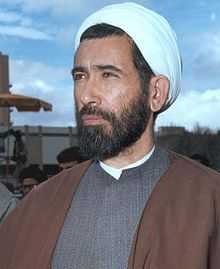Mohammad-Javad Bahonar
| Mohammad-Javad Bahonar محمد جواد باهنر | |
|---|---|
 | |
| 77th Prime Minister of Iran 3rd Prime Minister of the Islamic Republic | |
| In office 15 August 1981 – 30 August 1981 | |
| President | Mohammad-Ali Rajai |
| Preceded by | Mohammad-Ali Rajai |
| Succeeded by | Mohammad-Reza Mahdavi Kani (Acting) |
| Minister of Culture and Islamic Guidance | |
| In office 10 August 1980 – 10 August 1981 | |
| President | Abolhassan Banisadr |
| Prime Minister | Mohammad-Ali Rajai |
| Preceded by | Ali Akbar Parvaresh |
| Succeeded by | Ali Shokoohi |
| Leader of the Islamic Republican Party | |
| In office 29 June 1981 – 30 August 1981 | |
| Deputy | Mir-Hossein Mousavi |
| Preceded by | Mohammad Beheshti |
| Succeeded by | Ali Khamenei |
| Personal details | |
| Born | 5 September 1933 Kerman, Iran |
| Died | 30 August 1981 (aged 47) Tehran, Iran |
| Political party | Islamic Republican Party |
| Alma mater | University of Tehran |
| Religion | Shia Islam |
Mohammad Javad Bahonar (Persian: محمدجواد باهنر, 5 September 1933 – 30 August 1981) was an Iranian scholar, Shia theologian and politician who served as the Prime minister of Iran from 15 to 30 August 1981 when he was assassinated by Mujahideen-e Khalq MEK, also known as PMOI and KMO. He is the first Iranian cleric Prime Minister.
Early life and education
Mohammad-Javad Bahonar was born on 5 September 1933 in Kerman, Iran.[1] He attended Masoumiyeh school of Kerman and then, Qom Seminary.[2] He received a PhD in theology from the University of Tehran.[2]
Career and activities
Bahonar began his career as a faculty member at the university of Tehran, becoming professor of theology.[2] He was imprisoned several for his anti-government activities and his study at ministry of education during the 1960s.[2] He jailed for eleven years from 1964 to 1975.[2]
Following the revolution Bahonar became a founding member of the Islamic Republican party[3] and an original member of the Council of Revolution of Iran. He was also appointed minister of education.[2] After the assassination of Mohammad Beheshti on 28 June 1981, he was appointed general secretary of the party where he was also a member of the central committee.[3]
Bahonar served as the minister of culture and Islamic guidance under Mohammad Ali Rajai's prime ministry from March 1981 to August 1981, and continued efforts to purge Iranian universities of secular influences, in what became known as the Islamic Cultural Revolution. When Rajai became president on 4 August 1981, he chose Bahonar as his prime minister.
Assassination
Bahonar was assassinated after less than two months in these offices, along with Rajai and other party leaders, when a bomb exploded at his office in Tehran on 30 August 1981.[4][5] The assassin was identified as Massoud Kashmiri, an operative of The People's Mujahedin of Iran (also known as the MKO, MEK and PMOI), who had infiltrated the Prime Ministry in the guise of a state security official.
References
- ↑ "An index of memories of Mohammad Javad Bahona". Maryrdom and Sacrifice. Retrieved 2 February 2013.
- ↑ 2.0 2.1 2.2 2.3 2.4 2.5 "Joint Crisis: Supreme Defense Council of Iran, 1980" (PDF). Harvard Model United Nations. Retrieved 3 October 2013.
- ↑ 3.0 3.1 Asayesh, Hossein; Adlina Ab. Halim, Jayum A. Jawan and Seyedeh Nosrat Shojaei (March 2011). "Political Party in Islamic Republic of Iran: A Review". Journal of Politics and Law 4 (1). Retrieved 29 July 2013.
- ↑ The Pearson General Knowledge Manual 2010 (New Edition). Pearson Education India. 1 January 2010. p. 1. ISBN 978-81-317-2790-4. Retrieved 3 February 2013.
- ↑ Nikou, Semira N. "Timeline of Iran's Political Events". United States Institute of Peace. Retrieved 27 July 2013.
External links
- Iran: Will The New President Have A Big Tent? Radio Liberty
| Political offices | ||
|---|---|---|
| Preceded by Ali Shokoohi |
Minister of Culture and Islamic Guidance 1980–1981 |
Succeeded by Ali Akbar Parvaresh |
| Preceded by Mohammad Ali Rajai |
Prime Minister of Iran 1981 |
Succeeded by Mohammad Reza Mahdavi Kani |
| Party political offices | ||
| Preceded by Mohammad Beheshti |
Leader of the Islamic Republican Party 1981 |
Succeeded by Ali Khamenei |
| ||||||||||||||
|
.svg.png)